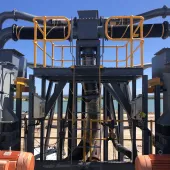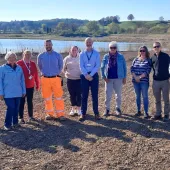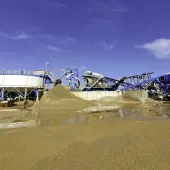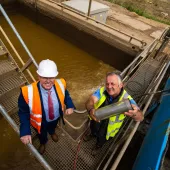Quarry Dewatering: A New Era
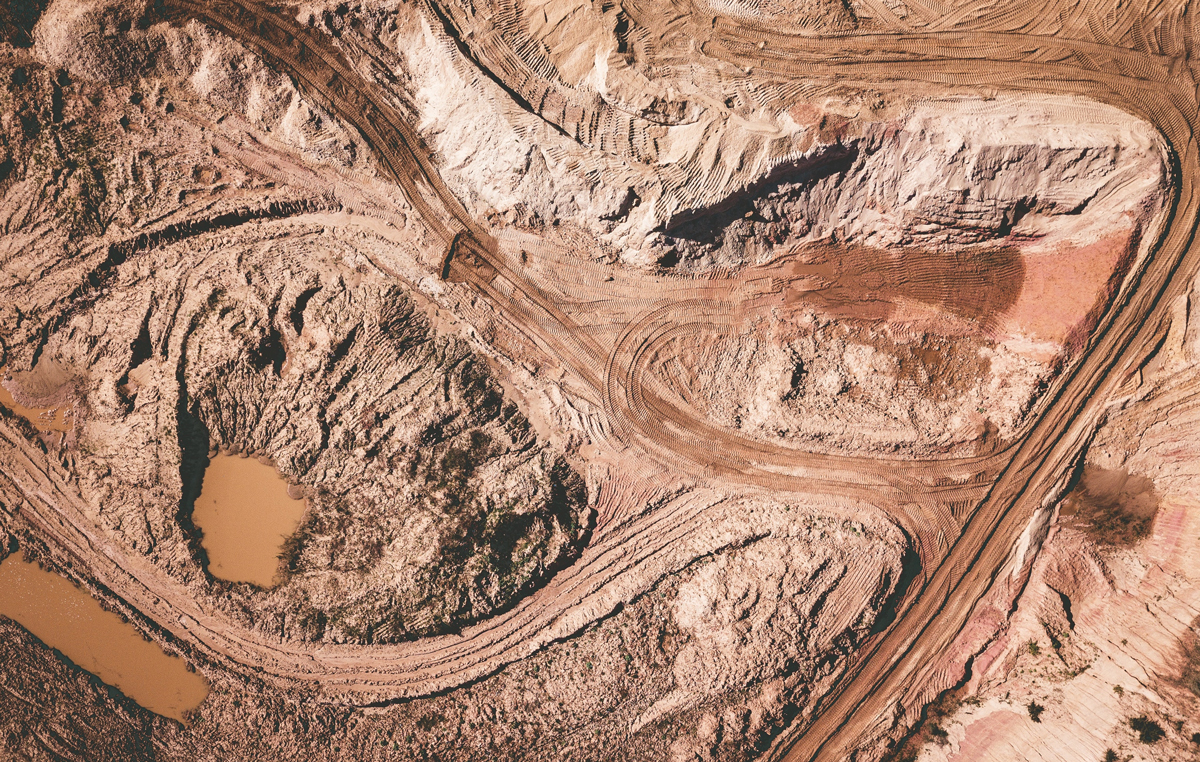
First published in the February 2020 issue of Quarry Management
Understanding the new water abstraction licensing regime and its implications in England and Wales
By James Dodds, director and chairperson, Envireau Water
On 31 October 2017, Defra/Welsh Government announced that the Transitional Arrangements for licensing of the historically exempt abstractions for quarry dewatering would come into force on 1 January 2018 in England and Wales. Those arrangements were supposed to last until 31 December 2019 but have been extended to 30 June 20201. But this article is not about that, it is about a New Era – an era where abstraction licences are needed before you start dewatering, and changes to existing licences or validated applications are needed before you make changes to your site or pumping arrangements. New licences or changes will take months to arrange and could take years to obtain.
For those that want or need to know the legal background, the key documents are: Government response to consultation on changes to water abstraction licensing exemptions in England and Wales: New Authorisations; The Water Act 2003 (Commencement No. 12), Order 2017; and The Water Abstraction (Transitional Provisions) Regulations 2017; together with the Water Resources Act 1991 and the Water Act 2003.
The new era introduces two situations. The first is where you were dewatering before 31 December 2017, and the second is after that date. The important point for this topic is that ‘now’ started on 1 January 2018. If you started dewatering, changed your dewatering arrangements, increased rates or volumes, or plan to dewater after 31 December 2017, you must have an appropriate abstraction licence in place before you start, or should have had one in place before you started.
There are three types of abstraction licences; a full licence; a transfer licence; and a temporary licence. In simple terms, a full licence is required if you are abstracting more than 20m3/day and are using the water, eg for dust suppression, wheel washing, domestic use, product washing etc. A transfer licence is used where water is moved from one place to another, without an intervening use. In most cases, dewatering would require a transfer licence. A temporary licence is used to abstract over a fixed 28-day period and has limited applicability in the quarrying industry.
In theory, the licence application process is straightforward. You think about how much water you need to abstract or need to use and where you are going to abstract from, fill in the application form and submit it to the Environment Agency or Natural Resources Wales, as appropriate2. In both cases the regulators have between three and four months to determine the application once they have accepted the application pack as valid (ie that all the necessary information and the application fee has been included).
If only it were that simple. The fundamental approach to decision making is that the applicant can justify the amount of water being applied for, that the water is there, and that the act of abstracting the water will not impact on the natural environment or prevent other abstractors from their legitimate right to abstract by virtue of an abstraction licence or other protected right. It is the applicant’s job to undertake the technical assessment to support the application, identify other abstractors or environmental features that might be at risk, undertake a risk assessment and, if necessary, propose and design mitigation.
In essence, this is similar to the work required (with respect to water) to support a planning application. However, in the case of a planning application, the Environment Agency/Natural Resources Wales only have an advisory role. The mineral planning authority is the decision maker and its remit is based on the balance of many different social and technical factors, only one of which is water. In the case of an abstraction licence, the Environment Agency or Natural Resources Wales is the decision maker and their scope of considerations is much narrower. Consideration of the social/financial benefits of the operation carries little, if any, weight. It is also important to recognize that the regulators in this case can end up holding a financial liability in the event that they issue a licence, the effect of which derogates the ability of another abstractor to abstract3.
For example, the Environment Agency interprets derogation as occurring when dewatering from a quarry prevents another licensed groundwater abstractor from taking their licensed rate or volume. This can happen when the additional drawdown resulting from the quarry dewatering causes the water level in the abstractors borehole to fall to a level that prevents them from abstracting their full licensed entitlement. An important note is that the duration of the impact is not a consideration; ie if there is a risk of derogation, it does not matter when the impact will occur or for how long.
It follows that the applicant must make an assessment of whether there is a risk of derogation. The Environment Agency and Natural Resources Wales consider that the assessment must be precautionary; that is, if there is uncertainty or a third party will not allow access to undertake a survey or supply information, it must be assumed that derogation may occur. The outcome of such an assessment would be that the regulator would have to refuse the licence application.
This raises a whole host of questions and issues, including: How far from the quarry must the survey extend? How do we predict the area affected? How do we predict how much impact?
While good hydrogeological analysis can answer these questions, in many circumstances, 100% certainty is a challenge.
If there is a risk of derogation, the quarry can enter into a derogation agreement with the other abstractor. However, there is no obligation on the abstractor to sign such an agreement and significant inducement can be required. Derogation can also be mitigated by techniques such as: recharging some or all dewatering water back to the groundwater via trenches, boreholes or lagoons; deepening the neighbours borehole; or supplying mains water, amongst others. However, some of these measures may be material considerations within a planning context and may or may not be permitted within existing or future planning applications.
Wrapped around the derogation issue is the impact on the natural environment, Groundwater Dependent Terrestrial Ecosystems, and the status of water bodies. Natural England and the nature conservation functions within Natural Resources Wales are statutory consultees on abstraction licence applications and they too must be satisfied that their interests are protected or impacts mitigated.
The complexity of both the abstraction licence application process and the relationship with the mineral planning authority means that, for new developments and extensions, these matters must be twin-tracked and there must be a good dialogue between the mineral planning authority and the Environment Agency or Natural Resources Wales. The first implication of this is that the water management and licensing of a site must be considered very early in the project design and development process – at least as early as the point when the lands or estates team is developing a plan. This is far earlier in the project timeline than was generally the case in the past. A second consequence is that in order to consider the type of licence, possible impacts and mitigation options, detail is required on the site water management and quarry design and operation very early in the project design. Historically, the details on these aspects were only considered once planning permission had been granted and often when operations had started and a manager was on site. In the New Era, this detail is required before the technical investigations are undertaken and before an application is made. Failure to define the water-management system, which defines the technical assessment and the correct application, could quite easily prevent a site with planning permission from operating.
In all this complexity, it should be remembered that there is an important exemption from the licensing requirements; that is, a site where the level of water in the excavation depends wholly or mainly on rainfall. ‘Wholly or mainly’ is not well defined, and while operating agreements are in place with the regulators, this aspect should be considered for all new developments to ensure that it does not apply.
The new abstraction licensing regime really is a New Era which started at the beginning of 2018 and ups the game in terms of technical assessment. It impacts on the fundamentals of the way quarry projects are planned, developed and executed. It changes the priority of water management at a quarry from an engineering day job to something that can quite easily close down a site. It is critical that the industry at all levels and across all disciplines understands the New Era and the implications that come with it.
References
- The Water Abstraction (Transitional Provisions) (Amendment) (England) Regulations 2019.
- These regulations do not apply in Scotland or Northern Ireland, where different arrangements are in place for licensing/permitting.
- Derogation is defined in the Water Resources Act 1991, s39.
Envireau Water
Envireau Water have been closely involved in the development and implementation of the new regulations and provide expert guidance on the management and regulation of natural water systems, with a reputation underpinned by more than 20 years’ experience in the UK quarrying sector. The author, James Dodds CGeol FGS FIQ, is a nationally recognized expert in water management and water resources hydrogeology, particularly within the minerals sector, and has a reputation for his tenacity with regulatory systems. For more information contact: www.envireauwater.co.uk
- Subscribe to Quarry Management, the monthly journal for the mineral products industry, to read articles before they appear on Agg-Net.com




